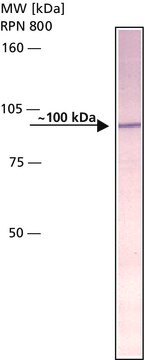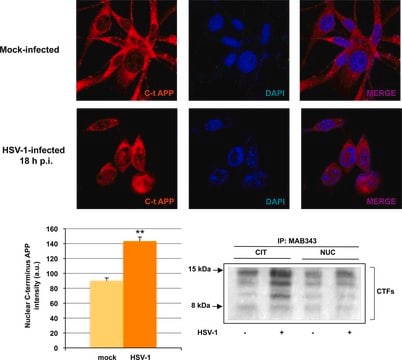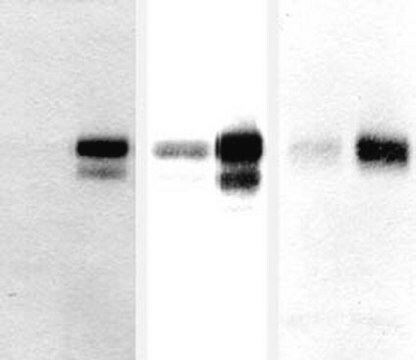AB5302
Anti-Amyloid Precursor Protein Antibody, KPI Domain
serum, Chemicon®
Synonyme(s) :
APP
About This Item
Produits recommandés
Source biologique
rabbit
Niveau de qualité
Forme d'anticorps
serum
Type de produit anticorps
primary antibodies
Clone
polyclonal
Espèces réactives
monkey, mouse, human, bovine
Fabricant/nom de marque
Chemicon®
Technique(s)
immunocytochemistry: suitable
immunohistochemistry: suitable
immunoprecipitation (IP): suitable
western blot: suitable
Numéro d'accès NCBI
Numéro d'accès UniProt
Conditions d'expédition
dry ice
Modification post-traductionnelle de la cible
unmodified
Informations sur le gène
human ... APP(351)
Spécificité
Immunogène
Application
Immunoprecipitation: Requires reductions and alkylation of disulfide bonds.
Immunocytochemistry: On Cos7 and NteraZ cell lines, requires reduction and alkylation of disulphide bonds.
Immunohistochemistry: Works on formaldehyde fixed, paraffin embedded tissue, requires reduction and alkylation of disulphide bonds or microwaving.
Optimal working dilutions must be determined by end user.
Reduction /Alkylation protocol:
To reduce incubate the slide (Blot) in TBS (PBS) + 50mM 2-mercaptoethanol at 37°C for 3 h in the dark. Wash twice with TBS, then incubate in TBS (PBS) + 20 mg/ ml of Iodoacetic acid for 30 min at room temperature. Wash twice with TBS (PBS), block and process as usual.
Informations légales
Vous ne trouvez pas le bon produit ?
Essayez notre Outil de sélection de produits.
En option
Code de la classe de stockage
10 - Combustible liquids
Classe de danger pour l'eau (WGK)
WGK 2
Point d'éclair (°F)
Not applicable
Point d'éclair (°C)
Not applicable
Certificats d'analyse (COA)
Recherchez un Certificats d'analyse (COA) en saisissant le numéro de lot du produit. Les numéros de lot figurent sur l'étiquette du produit après les mots "Lot" ou "Batch".
Déjà en possession de ce produit ?
Retrouvez la documentation relative aux produits que vous avez récemment achetés dans la Bibliothèque de documents.
Notre équipe de scientifiques dispose d'une expérience dans tous les secteurs de la recherche, notamment en sciences de la vie, science des matériaux, synthèse chimique, chromatographie, analyse et dans de nombreux autres domaines..
Contacter notre Service technique







